[Event Report] The 72nd Breakfast Meeting—”Women’s Empowerment and Workplace Wellness—Efforts to Promote Women’s Health in the Workplace” (September 6, 2018)
date : 10/19/2018
Tags: HGPI Seminar, Women's Health
![[Event Report] The 72nd Breakfast Meeting—”Women’s Empowerment and Workplace Wellness—Efforts to Promote Women’s Health in the Workplace” (September 6, 2018)](https://hgpi.org/en/wp-content/uploads/sites/2/81969daa247d628979e46a731c0a16c3-e1539934719661.jpg)
With women’s empowerment making progress in the workplace, the government and industry have recently been increasing their focus on initiatives aimed at women’s health. Focusing on the topic of women’s health, participants at this Breakfast Meeting heard from Ms. Masae Okuyama, Manager of the Human Resources Planning Team, Human Resources Department, Pasona Group Inc.; Mr. Masatoshi Aochi, Marketing Director of the Workplace Wellness Solutions Division, Pasona Corporation; and Ms. Akemi Aoki, Head of the Diversity & Inclusion Development Center, Human Capital Group, Hitachi Systems, Ltd.; regarding each company’s progressive women’s health initiatives.
Health and Global Policy Institute (HGPI) Senior Associate Yuko Imamura opened the meeting by introducing several activities that HGPI has been conducting to promote women’s health initiatives including the “Survey on Health Promotion and Working Women 2018” that was announced in March 2018.
Overview of Best Practices
■Pasona Group Inc.: “Women’s Careers and Their Health—Creating Workplaces Where Women Flourish”
To meet the demands of each life stage, including marriage, having and raising children, and caring for aging family members, Pasona Group Inc. developed a life- and career-support system for women that also addresses career development. To increase future utilization of this system, Pasona Group Inc. has been taking steps such as (1) increasing information touchpoints, (2) establishing easy-access support desks, and (3) fostering a climate that involves families. Since 61% of its employees are women, the company has also been placing particular emphasis on women-centered health issues such as physical complaints including shoulder stiffness, back pain, and chills, as well as premenstrual syndrome (PMS), anemia, and menopause, in addition to being underweight (having a low BMI) and the three major deficiencies–lack of exercise, lack of nutrition, and lack of sleep. For example, at the company’s “Healthy Beauty School,” which targets women with low body weights, a program was offered that combined classroom and hands-on learning led by public health nurses and registered dieticians. Results have included not only healthy increases in body weight and decreases in general malaise, but have also been reflected in the fact that 55% of participants reported improvements in work productivity. Moreover, comparing this program, which had zero dropouts and a 100% satisfaction rate, to previous health promotion programs, made it clear that to improve women’s health literacy, rather than simply pushing “health,” it is important to appeal to the unique goals of each individual, to increase the sense of satisfaction by implementing a combination of classroom and hands-on learning, and to group together participants who share similar concerns.
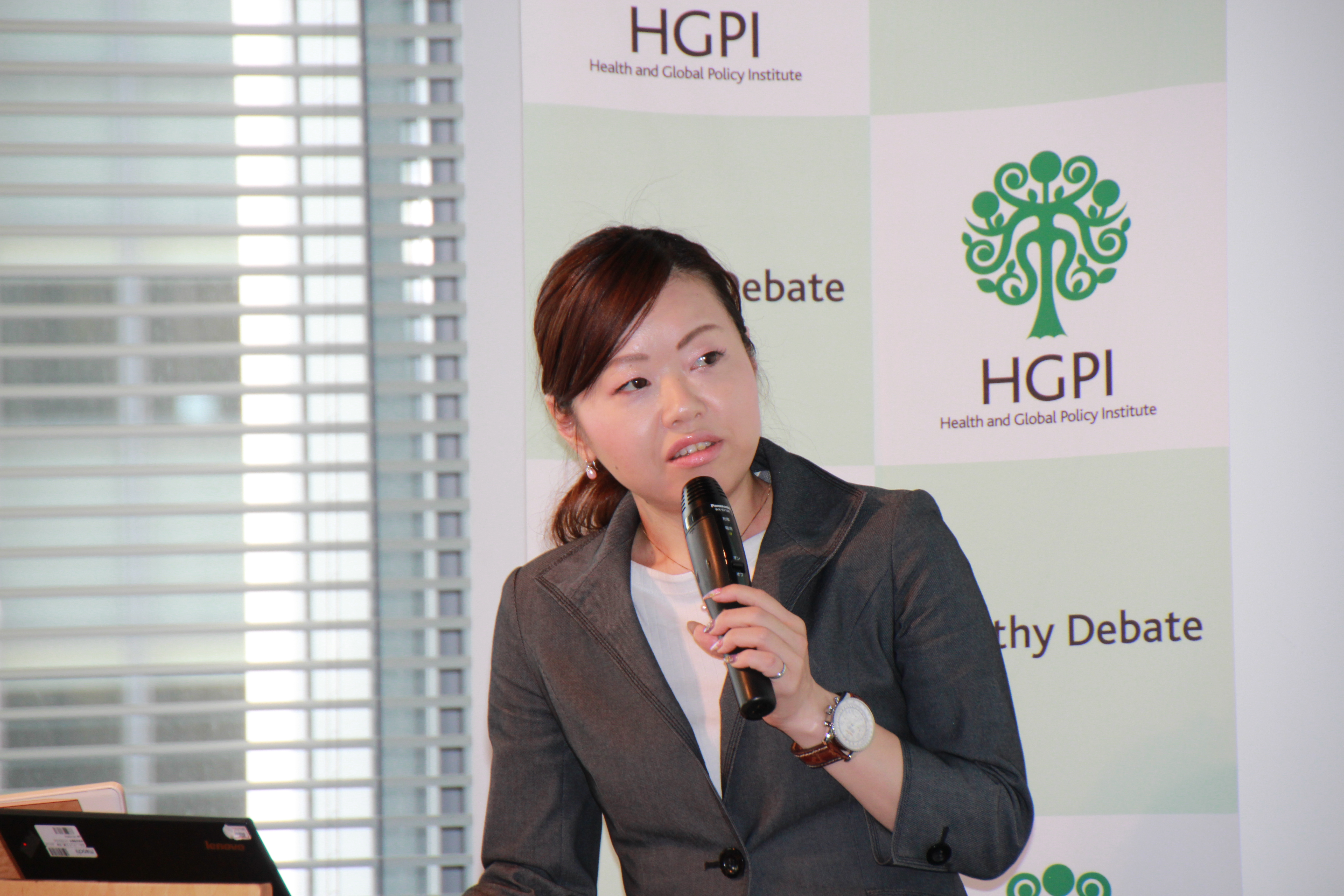
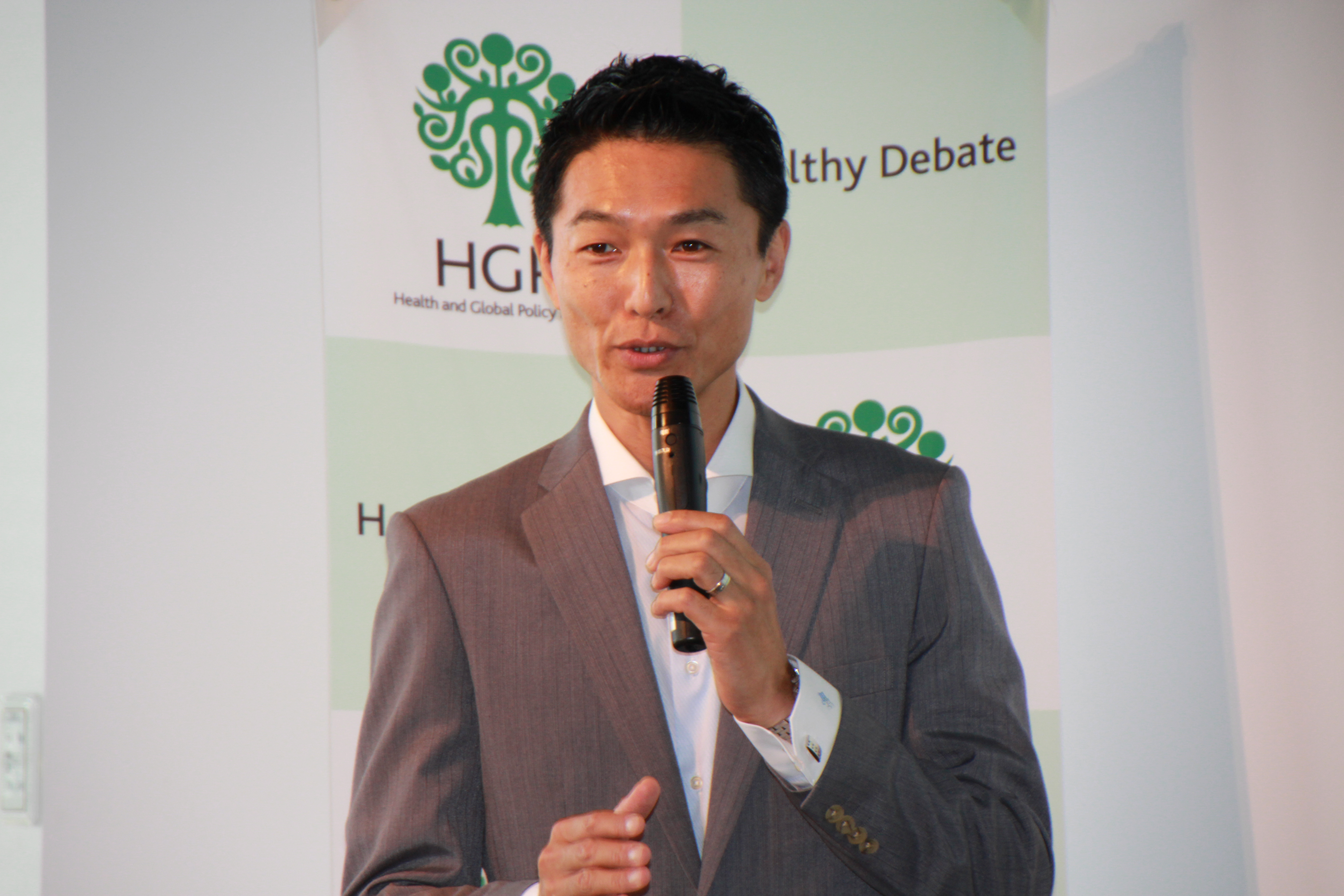
■Hitachi Systems, Ltd.: “Women’s Health Initiatives”
At Hitachi Systems, Ltd., women’s health is being addressed as part of the “SMILE Work∞Life Action” corporate vitality improvement policy, a policy based on the three pillars of work-life balance reform, workplace wellness, and diversity promotion. Although the percent of employees who are women remains low, at 14%, issues tied to women’s health concerns and how to handle them have been raised not only by women themselves but also by their supervisors. Thus in order to support women’s health and empowerment, the organization has decided to come together and work as one.
As a specific example, the company holds lectures led by obstetrician/gynecologists (OB/GYNs) for executives and management in addition to seminars available to all employees. After addressing topics such as the association between women’s health, hormones, and life stages as well as how women interact with their OB/GYNs, many participants expressed the desire to change their future behavior.
Another topic being emphasized is “Cancer and Employment.” Since data indicates that 35% of women living with cancer are of working age and nearly half of the women working at Hitachi Systems Ltd. are not receiving cancer screenings, the company is working to raise awareness and to establish support systems. “Cancer and Employment Seminars” targeting all employees are being conducted nationwide. At these seminars, in addition to explaining company programs and work-life balance support systems, the voices of cancer survivors are also being shared. The company also sends letters to all employees’ families to inform them of cancer screenings and the system of applicable subsidies.
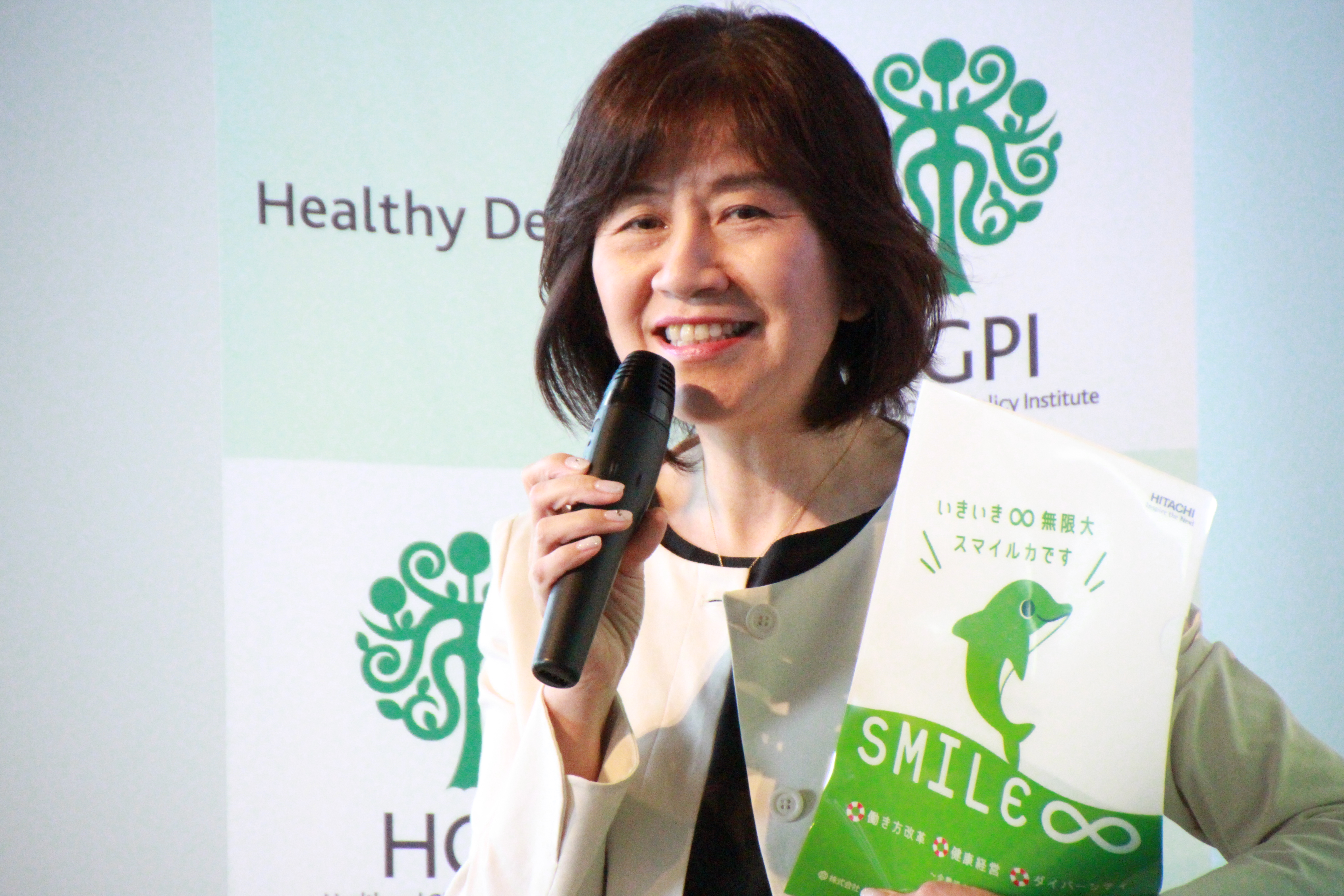
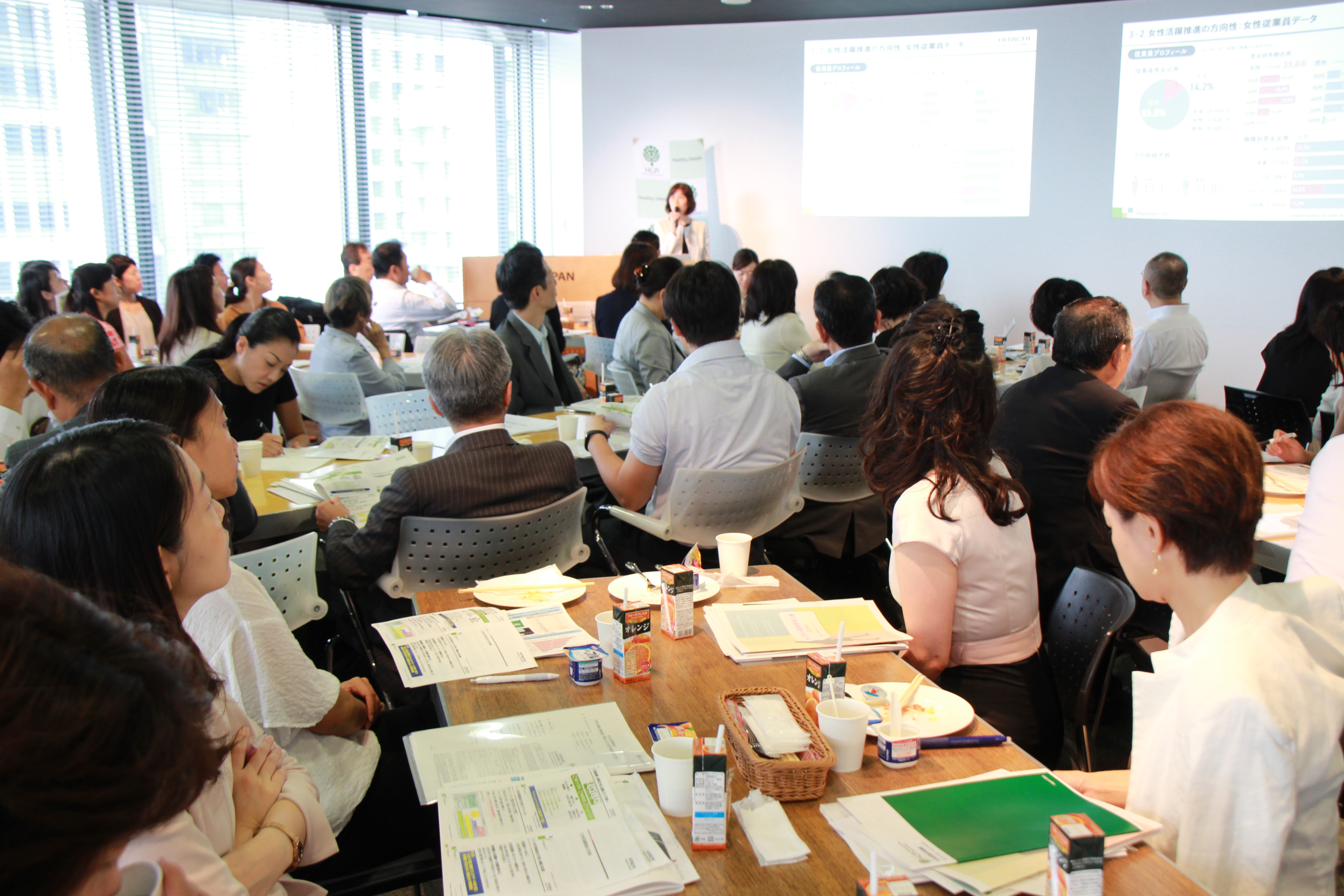
Question and Answer Session
Amidst the promotion of workplace wellness by organizations as a whole, a question and answer session was held, during which lively exchanges of opinion took place on issues such as how to position the promotion of women’s health and which types of specific initiatives are possible.
■Fostering communication with management in order to raise awareness of the importance of promoting women’s health
(Pasona Group, Inc.) Due to the fact that the company was founded upon the premise of creating new ways of working that support women’s return to the workplace, the company as a whole takes a positive stance toward initiatives aimed at women’s careers and their health. In addition, by individually consulting with company representatives, giving presentations at executive committees, and communicating directly with management, the company is developing ways to gain the understanding of management with respect to women’s health measures.
(Hitachi Systems, Ltd.) With such a small number of female employees, rather than pursuing stand-alone initiatives under the term “women’s health,” the company is conveying to management the need for action as part of the “SMILE Work∞Life Action” diversity promotion campaign. To demonstrate the commitment of management, the president speaks to all employees about topics such as the importance of health and diversity at an annual diversity conference.
■The role of occupational health physicians in advancing women’s health promotion policies
(Pasona Group, Inc.) By participating in health committees and presenting lecturers at management and employee trainings, occupational health physicians are involved in the health promotion initiatives of the company as a whole. They are also working to create an environment where employees are able to consult them at any time.
(Hitachi Systems, Ltd.) Occupational health physicians not only participate in safety and health committees, they also share their expertise in a variety of ways including during individual physical and mental health consultations, return-to-work programs, and health-related seminars. New initiatives proposed by these physicians are being actively introduced.
■Handling cases in which occupational health physicians lack specialization in the gynecological field
(Pasona Group, Inc.) Public health nurses provides first-line response, followed by referrals to gynecologists affiliated with the company’s occupational health physicians. Since many occupational health physicians are male, employees who would prefer to see a female physician are given the option of teleconferencing, thus enabling consultations regardless distance.
(Hitachi Systems, Ltd.) With public health nurses stationed nationwide, employees are asked to first consult the nurse at their place of work, after which they are put in contact with a specialist based upon the consultation results. Employee peer supporters are also available, and the company is working to create an environment in which employees are able to seek support from the beginning, rather than taking on their concerns alone.
■Collaboration with health insurance societies
(Pasona Group Inc.) Employees are insured through the Health Insurance Society for Temporary Workers. Due to its extremely high female enrollment rate, enrollees are eligible to receive detailed support not only at health exams, but also substantial support at breast and uterine cancer screenings.
(Hitachi Systems, Ltd.) In cooperation with the Hitachi Health Insurance Association, a health insurance association of the Hitachi Group, initiatives are being implemented that enable employees to have fun while improving their health such as walking tournaments participated in by teams of coworkers.
■Implementing outcome indicators and evaluation methods
(Pasona Group, Inc.) As a result of the company’s sustained efforts to create comfortable work environments for employees, one of the achievements has been a reduction in the turnover rate, which remains in the single digits. Focusing on the company’s headquarters, methods are currently being devised to create workplaces that are comfortable for everyone, regardless of gender, but it is likely to take time before outcomes become numerically apparent.
(Hitachi Systems, Ltd.) Due to the challenging nature of producing results in a short span of time, concrete, numerical targets are yet to be achieved. However, due to the ongoing efforts of “SMILE Work∞Life Action,” numerical targets such as those for work satisfaction and turnover rate are expected to be achieved in the future, regardless of gender.
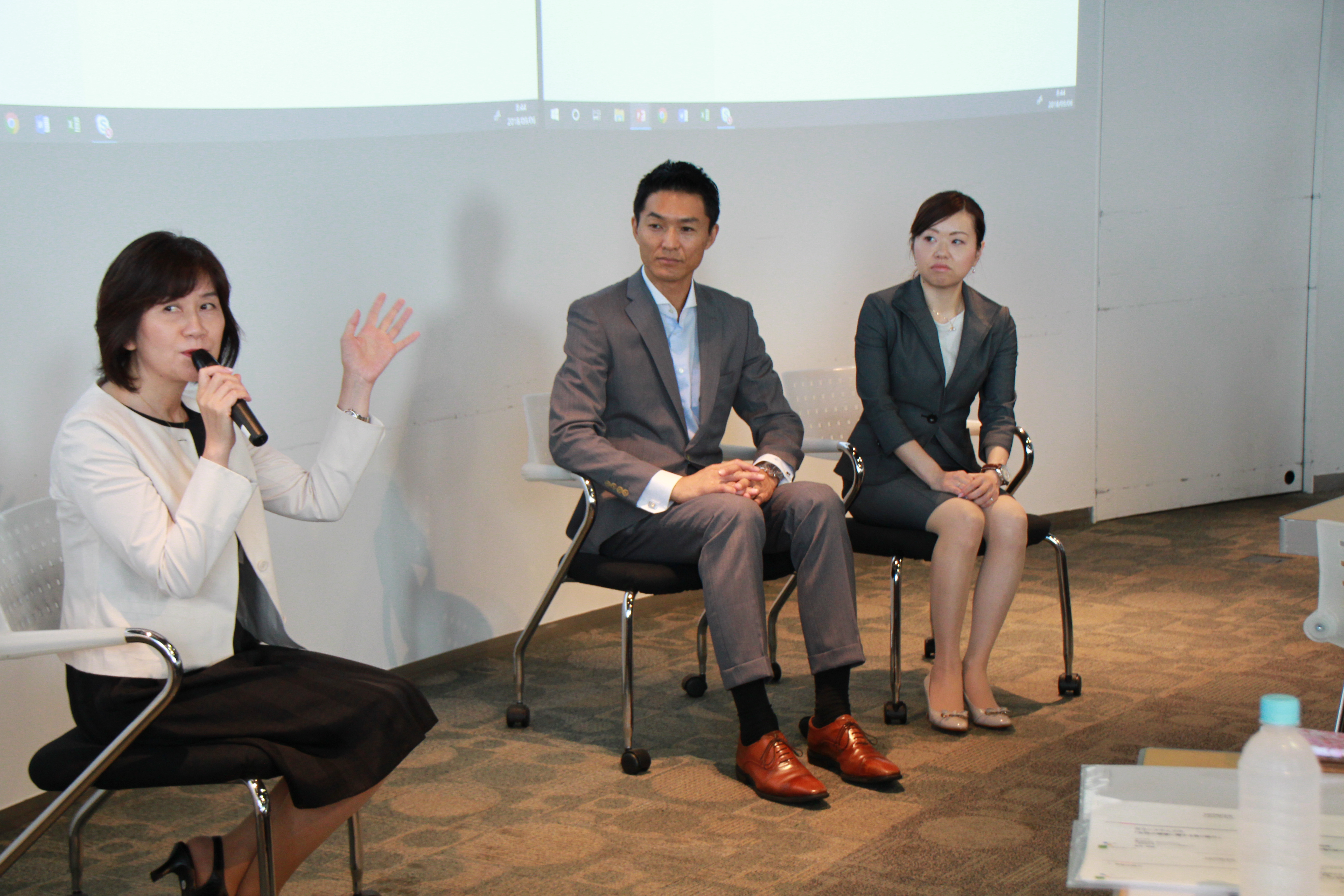
Special Commentary
To conclude the meeting, Ms. Haruna Konno, Section Manager of the Healthcare Industries Division within the Commerce and Service Group of the Ministry of Economy, Trade and Industry (METI), introduced a workplace wellness recognition program that is being promoted by the Ministry.
■Women’s health initiatives within workplace wellness
Until now, workplace wellness initiatives have primarily targeted men, such as efforts aimed at preventing lifestyle diseases like metabolic syndrome. But based on the current situation in which women comprise around 44% of Japan’s total workforce (2016), it is thought that increasing the number of initiatives aimed at women’s health will lead to further corporate revitalization. In addition, in terms of measures addressing health concerns particular to women, interest from companies actively promoting workplace wellness is particularly high. Accordingly, “Initiatives Aimed at Maintaining and Promoting Women’s Health” was added as one of the selection criteria for the 2019 Health & Productivity Stock Selection as well as for the 2019 Health and Productivity Outstanding Organization Selection. Questions about efforts made to acquire knowledge about health issues particular to women were also added to METI’s “Survey on Health and Productivity Management.” In the future, (1) improvements in health literacy, (2) the establishment of employee support desks, and (3) the implementation of policies aimed at improving work environments are expected to result in visible workplace wellness achievements such as the “prevention of employee turnover and absences due to issues such as illness,” “improvements in productivity,” and “improvements in sense of belonging.”
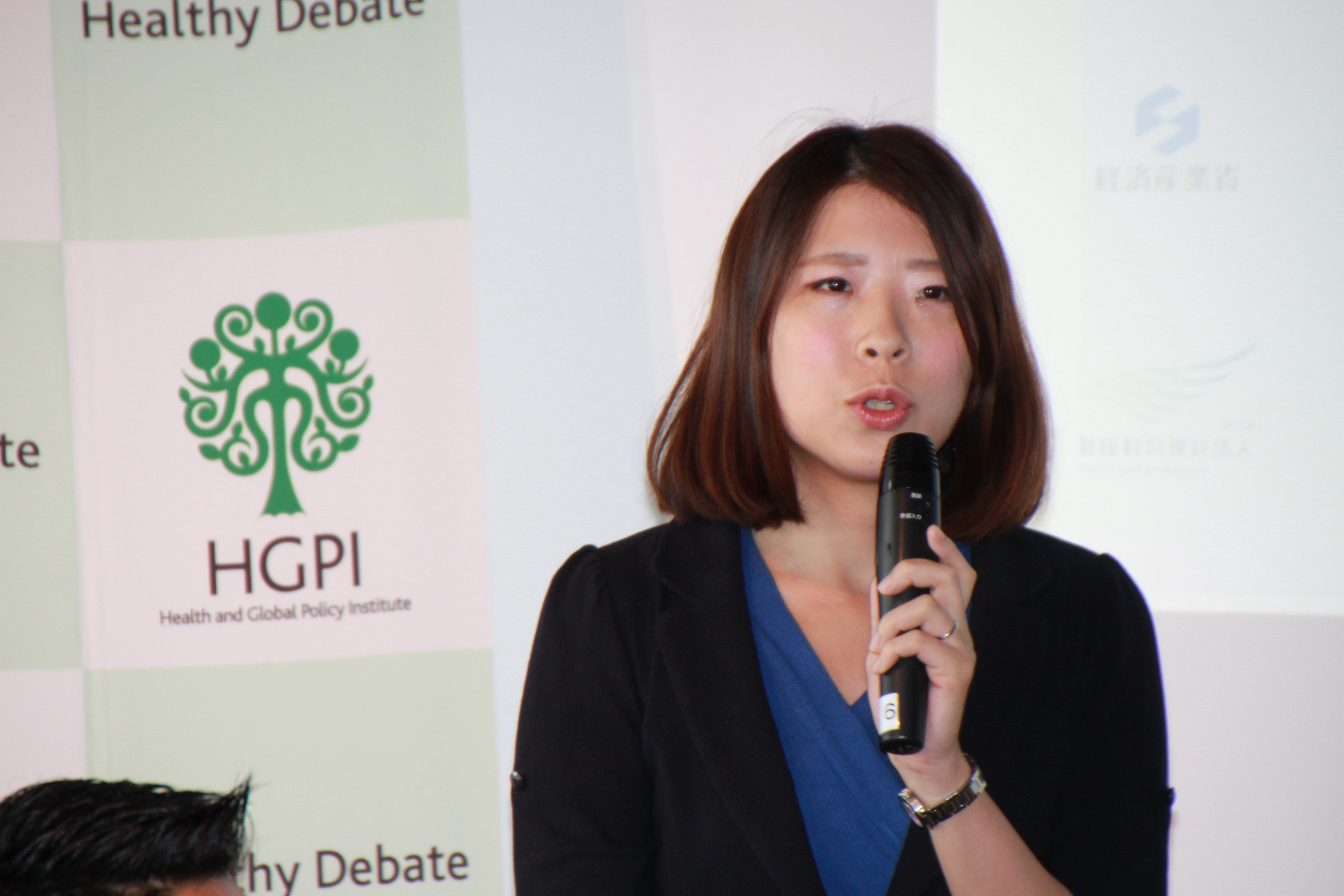
About Ms. Makoto Okuyama (Manager, Human Resources Planning Team, Human Resources Division, Pasona Group Inc.)
Since its founding in 1976, Pasona Group Inc. has supported female employees through a variety of programs, promoting the improvement of internal systems as well as the creation of comfortable work environments, while providing employment opportunities for all, regardless of nationality, age, gender, or disability. Pasona Group Inc. aims to create an environment that cultivates a society in which women can continue to actively participate in the workforce.
About Mr. Mitsuru Aoyama (Marketing Director, Workplace Wellness Solutions Division, Pasona Corporation)
In the Workplace Wellness Solutions Division, under the “@Health+Care” brand, Mr. Aoyama delivers services that address aspects of both health management and health promotion. Mr. Aoyama is also promoting workplace wellness programs within the Pasona Group itself, collaborating with their Human Resources Division.
About Ms. Akemi Aoki (Head of the Diversity & Inclusion Development Center, Human Capital Group, Hitachi Systems, Ltd.)
Ms. Akemi Aoki serves as Head of the Diversity & Inclusion Development Center, established in 2015 within the Human Capital Group of Hitachi Systems, Ltd. The promotion of women’s empowerment is a crucial theme within the promotion of workforce diversity. To that end, Ms. Aoki is developing various policies concerning the active involvement of all types of women in the workplace. Simultaneous advances are also being made regarding shifts in the awareness of male employees and managers. From 2017, Ms. Aoki also launched the “SMILE Work∞Life Action” campaign based on the 3 pillars of “work-life balance reform, workplace wellness, and diversity,” aiming to further promote corporate vitality.
Top Research & Recommendations Posts
- [Policy Recommendations] The Path to a Sustainable Healthcare System: Three Key Objectives for Public Deliberation (January 22, 2026)
- [Research Report] The 2025 Public Opinion Survey on Healthcare in Japan (March 17, 2025)
- [Research Report] Perceptions, Knowledge, Actions and Perspectives of Healthcare Organizations in Japan in Relation to Climate Change and Health: A Cross-Sectional Study (November 13, 2025)
- [Policy Recommendations] Reshaping Japan’s Immunization Policy for Life Course Coverage and Vaccine Equity: Challenges and Prospects for an Era of Prevention and Health Promotion (April 25, 2025)
- [Research Report] AMR Policy Update #4: Cancer Care and AMR (Part 1)
- [Research Report] The 2023 Public Opinion Survey on Satisfaction in Healthcare in Japan and Healthcare Applications of Generative AI (January 11, 2024)
- [Public Comment Submission] “Assessment Report on Climate Change Impacts in Japan (Draft Overview)” (December 24, 2025)
- [Research Report] The 2026 Public Opinion Survey on Healthcare in Japan (February 13, 2026)
- [Policy Recommendations] Developing a National Health and Climate Strategy for Japan (June 26, 2024)
- [Research Report] The Public Opinion Survey on Child-Rearing in Modern Japan (Final Report) (March 4, 2022)
Featured Posts
-
2026-01-09
[Registration Open] (Hybrid Format) Dementia Project FY2025 Initiative Concluding Symposium “The Future of Dementia Policy Surrounding Families and Others Who Care for People with Dementia” (March 9, 2026)
![[Registration Open] (Hybrid Format) Dementia Project FY2025 Initiative Concluding Symposium “The Future of Dementia Policy Surrounding Families and Others Who Care for People with Dementia” (March 9, 2026)](https://hgpi.org/en/wp-content/uploads/sites/2/dementia-20260309-top.png)
-
2026-02-05
[Registration Open] (Webinar) The 141st HGPI Seminar “Current Status and Future Prospects of Korea’s Obesity Policy: Voices of People with Lived Experience in Policy Promotion” (March 3, 2026)
![[Registration Open] (Webinar) The 141st HGPI Seminar “Current Status and Future Prospects of Korea’s Obesity Policy: Voices of People with Lived Experience in Policy Promotion” (March 3, 2026)](https://hgpi.org/en/wp-content/uploads/sites/2/hs141-top-1.png)




